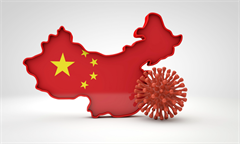
Financial Markets Rebound After Falling Sharply, But Recession Within Six Months Seems Likely
Stocks rose this morning “as Wall Street tried to recoup some of the sharp losses suffered in the previous session — the worst since the ‘Black Monday’ market crash in 1987,” write Fred Imbert, Yun Li and Eustance Huang of CNBC. “S&P 500 futures jumped more than 5% to reach their “limit up” level. These limit levels act as a ceiling for buying until regular trading begins and are meant to insure orderly trading. Dow Jones Industrial Average futures were up more than 1,100 points, implying a gain of nearly 1,000 points. Nasdaq 100 futures also surged.”
These large swings now seem almost “normal.” We’re operating in a period of extreme uncertainty, and it’s entirely natural for markets to reflect our collective sense of anxiety in difficult times.
That said, it now appears we are heading into a global recession within the next six months. The world – and our economy – has never experienced such a significant jolt. As Allianz Chief Economic Advisory Mohamed El-Erian shared on CNBC, global economies are headed toward COVID-19-driven recessions. From my perspective, the cascading effects of the coronavirus on multiple industry sectors (travel, hospitality, energy, financial services) and the continuing threat of global supply chain instability significantly raises the chances of a recession. We can hope for the best, but we must prepare for the worst.
China Lockdown Provides Key Leadership Lessons

I recommend reading this short article from the World Economic Forum summarizing China’s emergency lockdown measures. From my perspective, it clearly demonstrates the need for strong, coordinated action and smart use of existing technology to slow the spread of COVID-19.
“The lockdown affected more than 50 million people. Public transport services were shut down, including buses, railways, flights, and ferries. In Wuhan, the airport, railway station and metro transit system were closed too – and no one could leave the city without permission,” writes Sean Fleming of the World Economic Forum. “Soon after, the doors to factories, offices, and schools also closed. And authorities used popular social platforms and apps to monitor movement, with a green, yellow and red traffic-light system on people’s mobile phones helping officials determine if the user should be allowed past guards at train stations and other checkpoints.”
China also drafted healthcare workers from various regions in the country to help the efforts in Wuhan and built two new hospitals to accommodate the rapid influx of new patients.
Experts Not Sure if Warm Weather Will Slow the Virus

Some viruses are slowed by the onset of warm weather, but experts say it’s too early to tell whether COVID-19 will follow the pattern.
“Just because outbreaks of influenza wilt with seasonal changes doesn’t mean a different respiratory virus will behave in the same way,” write Ari Altstedter and John Lauerman in Bloomberg News. “Officials of the World Health Organization said March 5 there’s no reason to believe temperature will play a role in the outbreak but that the subject was worth investigating.”
Scientists are already researching the impact of weather on the virus, but no definitive results have been published yet.
Advice for Transitioning to Remote-Work

I strongly urge you to review this excellent article in the Harvard Business Review by Cali William Yost.
“The global spread of the virus may be a moment that reveals whether employers are ready to respond rapidly to unexpected workplace changes,” writes Yost. “Are organizations ready? Chances are probably not. “
In addition to re-reading the HBR article, I suggest taking another look at the special HMG Strategy article we published yesterday, which includes six essential steps for business continuity and preparedness in the face of continuing uncertainty.


